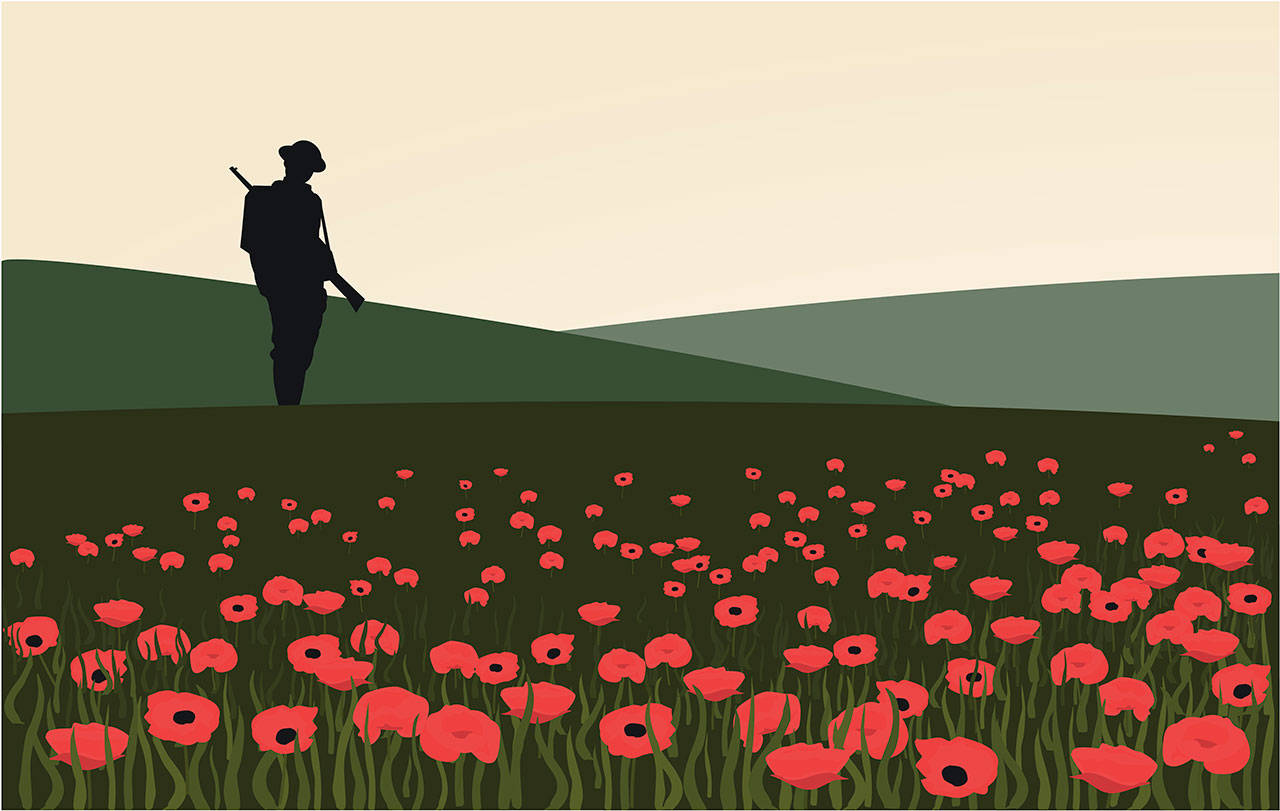By James Dubinsky
For The Conversation
Although Veterans Day is a national holiday, often filled with parades and celebrations, it brings with it ambiguity.
Howard Zinn, a World War II veteran, once wrote, “I do not want the recognition of my service to be used as a glorification of war.”
Sometimes the cost of the service and sacrifice can temper any desire to celebrate. Just consider the fact that even on the original Armistice Day, Nov. 11, 1918, almost 2,700 Allied and German soldiers died in combat.
Ambiguity is also the result of the growing gulf between those who have served and those who haven’t. At any given time, only .04 percent of the U.S. population is serving on active duty. In The Economist, a columnist recently explained, “The gulf between America’s armed forces and its civilians has never been greater. In 1990, 40 percent of young Americans had a military veteran for a parent; in 2016, only 16 percent did.”
Sometimes the ambiguity lies within the veteran community, and sometimes within individual veterans. Veterans’ experiences are not uniform. Some have seen combat; many have not. The story of each veteran’s service is unique.
As WWII vet Frank Brookhauser once said, “There was nothing right in one story. There is no such thing as one story if there are two people.”
Today, there are approximately 20.17 million veterans, 7 percent of the U.S. population. That’s more than 20 million stories, along with the stories of their loved ones. Sometimes poetry is the most effective way to capture both the ambiguity and the story.
Bridging divisions: One poet who is aware of these divides is Yusef Komunyakaa, an Army veteran who served in Vietnam from 1969 to 1970 and earned a Bronze Star. He is now a professor at New York University. Either with his own poetry such as “Facing It” or by encouraging us to read other veterans’ poems, Komunyakaa explains that poetry has dual roles: to delight and to instruct, a concept traced back to Aristotle and Horace’s “Ars Poetica.”
In “A Letter to the Editor,” Komunyakaa makes the case for such encounters with veterans’ poems, saying, “We need our young men and women, soldiers and civilians, to read good literature, to come across a voice like Yehuda Amichai’s in ‘What Did I Learn in the War.’” Amichai is considered by many to be Israel’s greatest poet. His poem describes the soldier’s experience:
“To march in a row and be alone in the middle,
To dig into pillows, featherbeds, the body of a beloved woman,
And to yell ‘Mama,’ when she cannot hear,
And to yell ‘God,’ when I don’t believe in Him”
Komunyakaa and Amichai emphasize the need to encounter and learn from stories of those who served. Even though much about those stories is unremarkable or routine, some is not. Debs Myers, a WWII vet, describes his fellow soldiers in “The GI”:
“He learned how to sleep in the mud, tie a knot, kill a man. He learned the ache of loneliness, the ache of exhaustion, the kinship of misery. From the beginning he wanted to go home. … He learned … that every man is alike and that each man is different, [but] if he was on the line it didn’t make much difference.”
Myers’ soldiers longed for home. Veterans are home, and even if people read the stories about what is like to be “over there,” they may not always understand what it is like to be over here. Brian Turner, an Iraq combat vet, describes such thoughts in a “Ashbah,” a poem in “Here, Bullet.” He is home, but he can’t help but think about:
“The ghosts of American soldiers
Wander the streets of Balad by night,
Unsure of their way home, exhausted.”
His poem helps us see that not just the ghosts are “unsure of their way home.” So, too, are those who survived and returned home, at least in the physical sense.
By being mindful, we might understand that on Veterans Day it is not simply enough to offer a free meal or host a parade. Honoring those who served means making an effort to connect with those who have served.
Eisenhower transformed Veterans Day from one that focused on WWI (it had been Armistice Day) to a celebration of those who served in all wars. Congress added the Moment of Silence Act in 2016, which asks for two minutes of silence “in honor of the service and sacrifice of veterans throughout the history of the nation.”
For the millions who have served — those who have not come home, those who have and those who have but who are caught in that space between here and there — celebration and silence are valued and appreciated. But are they sufficient to helping bridge the gap?
Service is integral to who veterans are, but it is transformational in ways that are not always easy to describe or celebrate. Listening to veterans’ stories and reading poems that attempt to capture the ambiguity and complexities of veterans’ experiences may offer another path to honor that service and sacrifice.
James Dubinsky is an associate professor at Virginia Tech. This article is republished from The Conversation under a Creative Commons license.
Talk to us
> Give us your news tips.
> Send us a letter to the editor.
> More Herald contact information.

























